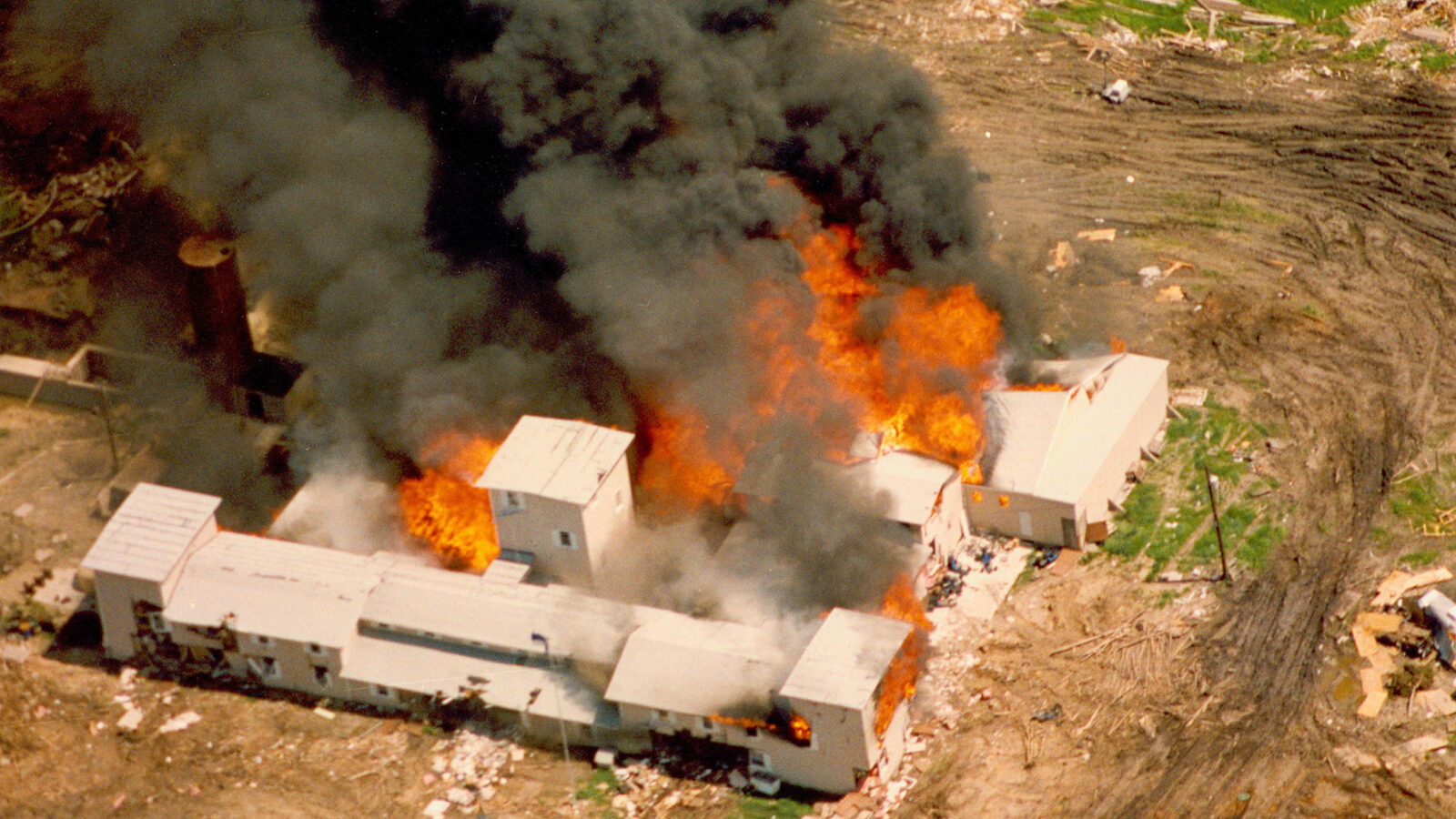On April 19, 1993—30 years ago—a 51-day standoff between the Branch Davidians and federal agents near Waco, Texas, ended in tragedy. Before that, on February 28, an attempt to serve a search-and-arrest warrant failed after a gunfight killing four agents and six Davidians.
During the April 19 attack on Mount Carmel, fire broke out in the buildings. The fire and gunshots killed 76 Branch Davidians: 25 children, two pregnant women, and the Davidian leader, David Koresh.
That was a tragedy of high order, but why should Adventists reflect on it?
“David Koresh, like all but seven of those who died at Waco, was a Seventh-day Adventist before being a Davidian, and his central beliefs go back to the birth of the Adventist Church, and before that to the Millerite movement,” says David Valdes Greenwood from Tufts University.1
They were part of our Church. What made them a part of a death cult when they had Adventist backgrounds? What lessons can we learn from then for now?
Who are the Branch Davidians?
In 1918, a Bulgarian immigrant to the United States, Victor Houteff, became a Seventh-day Adventist. In 1929, he declared the Church too worldly and that he was appointed to purify the church and to gather the 144,000 “servants of God” (Revelation 7).
He founded the Davidian Seventh-day Adventists and saw himself as the seventh of a line of reformers that included Martin Luther, William Miller and Ellen White. He based his organisation near Waco, Texas. At his death, his wife, Florence, took over until Jesus failed to return as she predicted in April 1959.
In the 1960s, after infighting, Ben Roden and his wife, Lois, led the movement. They became Branch Davidians when Ben claimed to be the “branch” of Zechariah 3:8 and 6:12. Lois took over after his death. Vernon Howell joined the group in 1981 and succeeded her.
Howell changed his name to David Koresh, symbolising a lineage back to the biblical King David. Koresh is Hebrew for Cyrus, the Persian king who was named a “messiah” for freeing Jews during the Babylonian captivity (Isaiah 45:1).
Two things were a constant—the attempt to gather followers from the Adventist Church; and Ellen White was considered a true prophet. In fact, Koresh idolised her and “pledged (in his 1987 audiotape Confusion) to honour the spirit of Ellen White. His last piece of writing refers to White’s words as ‘that beautiful prophecy’.”2
Koresh’s main emphasis, writes Jeff Guinn was, “simply put, as an integral aspect of the Lamb opening the Seven Seals [of Revelation 6-8], Koresh and his followers were commanded by God to fight, and lose to, modern-day Babylon. Their deaths were a necessary step to bring about the End Time, during which they’d triumphantly re-emerge.”3
The recruiting methodology
In both 1988 and 1990, Koresh had successfully recruited Seventh-day Adventist followers in Australia. After Waco, we, at Record, tried to understand how that could happen.4
Koresh targeted Pastor Barry Whelan’s Melbourne church in 1990. “He used well-trained followers—people he had taken to Texas and trained—and they moved into our youth Sabbath school,” he reported. “They targeted new members and any who had some dissatisfaction with the church.”
Koresh would organise meetings at night and would talk for 10-12 hours using what Whelan called brainwashing techniques. “He was charismatic. He was shrewd. At first, he appeared on the side of the church, but then began to create doubts about the ministry and then the church.”
Whelan and another pastor attended a house meeting Koresh ran and was surprised to find 20 of his church members attending. “We stayed until he implied that he was Jesus. At that point I said to him, ‘That’s enough.’ I stood and walked out and many followed.
“Koresh shouted at us, ‘I threw them out of my Father’s house 2000 years ago and now I throw you Pharisees out.’ I remember one of the girls on the lawn in front of the house saying, ‘But pastor, he’s Jesus! He’s Jesus!’”
Within a week, Koresh had new followers from Melbourne. Almost all from Whelan’s church returned.
Back then, I was surprised by the fear of retribution when I contacted former Branch Davidians. Most refused to talk to me. A few agreed if I didn’t identify them. Only one couple talked openly about their Davidian son.
“Koresh was a very dangerous man,” said one former Davidian. “He got them to believe that they could be martyrs who will be resurrected in three-and-a-half years. . . . I’m just grateful that [family member] was out of it.”
Another said that Koresh “was reasonable and well-read as far as the Scriptures are concerned. . . . He started speaking in a gentle, pleasant manner. He spoke about how he was going to right the wrongs in the world. . . . But then he began to make claims that he was the Christ. That’s when I began to question him.”
On the compound, she added, Koresh would begin a Bible study time at 10pm and continue to 2, 3 or 4am. He would sleep until midday or later, but the rest of the group had to rise to perform their morning duties.
A consistent warning came from these interviews, summed up well by one: “The only way we as a people can avoid this kind of thing happening again is to be rooted and grounded in the Scriptures.”
Tainted messiah
The day before law enforcement attempted to serve their search-and-arrest warrants, the Waco Tribune Herald ran a front-page article beginning: “If you are a Branch Davidian, Christ lives on a threadbare piece of land 10 miles east of here called Mount Carmel.”
It goes on to talk about Koresh’s dimples; his claim of a nine-grade education, his enjoyment of an occasional beer; that he “plays a mean guitar, reportedly packs a 9 mm Glock (handgun) and keeps an arsenal of military assault rifles”. And he “willingly admits that he is a sinner without equal”.5 Perhaps with good reason.
Koresh announced that God wanted him to have multiple wives and every woman or girl aged from about 12-up would be his wife and could only have sex with him for “procreation purposes”. He had “to sire 24 children who would become elders and help rule after the kingdom of God’s re-established, at the end times”. Husbands were forbidden from sex—a blessing, said Koresh, for they could focus on Bible study and becoming more “worthy of the Lord”.
“So it was sex,” says Guinn. “It was everyone else’s wives. And he even decided God wanted him to have the only unit air-conditioning in Mount Carmel.”6
Contrast that with the attitude and life of the Bethlehem-born Messiah.
A few thoughts
Religious fanatics and false messiahs have a very small god—one that fits their own imagining or interpretation of Scripture. God is bigger than their imaginings.
The true Messiah has already come.
We can have questions about difficult passages in the Bible, but there are few questions about how Jesus and the New Testament want us to live.
The Great Commission defines our marching orders, not Great Claims about ourselves.
David Koresh’s favourite prophet wrote that “No [one] [“man” in original] can improve the Bible by suggesting what the Lord meant to say or ought to have said” (Selected Messages, book 1, p 16). We can add that it is dangerous to try to force the Bible to say what it doesn’t. Waco is a reminder of that.
What would you add to the list?
1. <pbs.org/wgbh/pages/frontline/shows/apocalypse/readings/waco.html>.
2. op cit.
3. Jeff Guinn, David Koresh, the Branch Davidians, and a Legacy of Rage, 2023, e-book.
4. Lee Dunstan, Bruce Manners, “A cult that infiltrated the church,” Record, May 8, 1993, pages 10-12.
5. Mark England and Darlene McCormick, “The Sinful Messiah: part 1” Waco Tribune-Herald, February 27, 1993, page 1. <wacotrib.com/news/branch_davidians/sinful-messiah/the-sinful-messiah-part-one/article_eb1b96e9-413c-5bab-ba9f-425b373c5667.html>.
6. <npr.org/2023/01/25/1151283229/waco-branch-davidian-david-koresh-jeff-guinn
Dr Bruce Manners is a retired pastor and former editor of Adventist Record (from 1991–2004).






